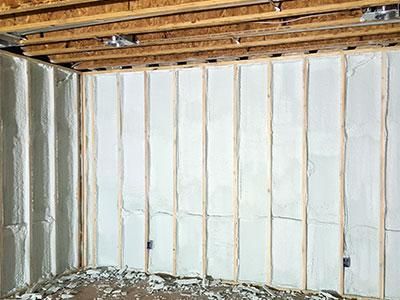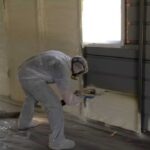Closed-cell spray foam insulation offers Garner property owners superior energy efficiency with R-values of 6.0-7.0 per inch, exceptional moisture resistance, and structural reinforcement benefits that withstand North Carolina’s variable climate conditions. This advanced insulation solution creates an airtight seal that significantly reduces energy costs by 25-40% annually while providing long-term protection against mold growth and air quality issues common in the humid southeast region.
The exceptional performance characteristics of closed-cell foam make it particularly valuable for Garner properties facing specific challenges like high humidity, temperature fluctuations, and occasional severe weather. According to the North Carolina Energy Office’s 2024 Efficiency Report, homes with closed-cell spray foam maintain consistent interior temperatures with 43% less HVAC cycling compared to traditional insulation methods, resulting in extended equipment lifespans and reduced maintenance costs.
How Closed-Cell Spray Foam Works
Closed-cell spray foam consists of millions of tiny, non-connected cells filled with an inert gas that creates a highly efficient thermal barrier. Unlike open-cell foam, these closed cells prevent air and moisture movement while providing exceptional insulating properties.
When applied, the liquid components react and expand to approximately 30-50 times their original volume, adhering to surfaces and hardening into a rigid insulation material with a density of 1.75-2.25 pounds per cubic foot.
Technical Specifications of Closed-Cell Spray Foam
| Property | Typical Value | Performance Impact |
| R-Value | 6.0-7.0 per inch | Superior thermal resistance compared to other insulation types |
| Density | 1.75-2.25 lb/ft³ | Higher density provides greater structural strength |
| Compressive Strength | 25-30 psi | Adds structural integrity to building elements |
| Water Vapor Permeance | 0.8-1.2 perms at 2″ thickness | Excellent moisture barrier properties |
| Air Permeability | <0.004 L/s/m² at 1″ | Creates an exceptional air barrier |
| Closed Cell Content | >90% | Higher percentage means better insulation performance |
| Sound Transmission | STC rating 37-45 | Moderate noise reduction capabilities |
| Fire Rating | Class A (ASTM E84) | Meets building code requirements for fire safety |
Bonus Tip: For crawlspaces in Garner properties, closed-cell foam applied at just 2 inches thickness can often eliminate the need for separate vapor barriers while providing superior moisture control compared to traditional methods.
Closed-Cell vs. Other Insulation Options for Garner Properties
Comparison with Alternative Insulation Types
| Feature | Closed-Cell Spray Foam | Open-Cell Spray Foam | Fiberglass Batts | Cellulose |
| R-Value per inch | 6.0-7.0 | 3.5-3.9 | 2.9-3.8 | 3.2-3.8 |
| Moisture Resistance | Excellent | Poor | Poor | Poor |
| Air Barrier | Yes (at 1-2″) | Yes (at 3″+) | No | No |
| Structural Support | Yes | No | No | No |
| Lifespan | 30+ years | 20+ years | 10-15 years | 15-20 years |
| Initial Cost | High | Medium-High | Low | Medium |
| Performance in Garner Climate | Excellent | Good | Fair | Good |
| Installation Complexity | Professional only | Professional only | DIY possible | DIY possible |
The North Carolina Building Performance Association reports that properly installed closed-cell spray foam can reduce air infiltration by up to 95% compared to traditional insulation methods, a significant advantage in Garner’s climate zone where humidity control is essential for both comfort and structural preservation.
Key Benefits for Garner Property Owners
Superior Energy Efficiency
Closed-cell spray foam creates a continuous air barrier that dramatically reduces thermal transfer through walls, ceilings, and floors. This comprehensive seal eliminates the energy waste from air leakage that typically accounts for 30-40% of heating and cooling costs in traditionally insulated buildings.
In Garner’s climate (Zone 4A), this translates to significant HVAC savings during both hot, humid summers and occasionally cold winter conditions. Energy modeling studies specific to central North Carolina demonstrate average annual energy savings of 25-40% for properties converted from traditional insulation to closed-cell spray foam.
Exceptional Moisture Management
The impermeable nature of closed-cell foam prevents moisture infiltration through the building envelope, addressing a critical concern in Garner’s humid climate. By creating an effective vapor barrier at just 2 inches thickness, closed-cell foam prevents condensation on surfaces and within wall cavities.
This moisture control capability significantly reduces the risk of mold growth, wood rot, and other moisture-related structural issues common in the Southeast region. For properties with basements or crawlspaces, this benefit becomes even more valuable in preventing humidity-related problems.
Structural Reinforcement
Closed-cell foam adds remarkable structural strength to building elements, with testing showing up to 250% increased racking strength in wall assemblies. This additional structural integrity proves particularly valuable in Garner, where properties may face severe weather events including occasional hurricanes and strong storms.
The rigid nature of cured closed-cell foam helps resist wind pressures and provides greater stability to roof assemblies, wall systems, and floor structures. This can be especially beneficial for older properties or those with specific structural concerns.
Bonus Tip: When insulating rim joists in Garner homes, closed-cell foam provides the dual benefit of thermal insulation and structural reinforcement at a critical junction point that’s often overlooked but responsible for significant energy loss.
Things to Consider Before Making a Decision
Climate-Specific Factors for Garner Properties
Garner’s location in central North Carolina places it in a mixed-humid climate zone with specific insulation challenges. Summer humidity levels regularly exceeding 70% create significant moisture management concerns, while winter temperatures occasionally dropping below freezing require consistent thermal performance.
Closed-cell foam addresses both these climate factors effectively, but the installation thickness should be tailored to local conditions. For optimal performance in Garner:
- Walls: Minimum 2-3 inches (R-12 to R-18)
- Attics/Rooflines: 3-5 inches (R-18 to R-30)
- Crawlspaces/Basements: 2-3 inches (R-12 to R-18)
Installation Considerations
Proper installation remains critical for realizing the full benefits of closed-cell foam. The application requires specific temperature and humidity conditions, typically:
- Ambient temperature: 40-120°F
- Surface temperature: 50-120°F
- Relative humidity: Below 80%
These requirements may affect seasonal installation timing in Garner, with spring and fall generally offering optimal conditions. Additionally, the property must remain unoccupied during installation and for a minimum 24-hour curing period afterward to allow for proper ventilation.
Budget and Return on Investment Analysis
The initial installation cost for closed-cell foam insulation typically ranges from $1.75-$3.50 per square foot in the Garner area, representing a higher upfront investment compared to traditional insulation options.
However, energy modeling for the region demonstrates that most properties recoup this initial investment through energy savings within 3-7 years, with older or poorly insulated homes often seeing faster payback periods. Additional savings come through potentially downsized HVAC equipment requirements and extended system lifespan due to reduced cycling.
Common Questions About Closed-Cell Spray Foam
What preparation is required before installation?
All surfaces must be clean, dry, and free of loose debris. Existing water or moisture issues must be resolved before application. Electrical fixtures should be properly protected, and HVAC systems turned off during installation.
How long does installation take for an average Garner home?
For a typical 2,000 square foot home, the installation process usually requires 1-2 days, followed by a 24-hour curing period before reoccupation.
Is closed-cell spray foam safe for occupants?
When properly installed and fully cured, closed-cell foam is considered safe for occupants. Modern formulations have significantly reduced VOC emissions compared to earlier products. Professional installers follow specific safety protocols during application, and homeowners should remain off-premises until the manufacturer’s recommended re-entry period (typically 24 hours).
Frequently Asked Questions
How does closed-cell foam perform in Garner’s specific climate conditions?
Closed-cell foam excels in Garner’s mixed-humid climate by addressing both summer humidity and winter temperature challenges. Its moisture-resistant properties prevent condensation and humidity infiltration during hot, humid summers, while its superior R-value maintains consistent interior temperatures during colder periods.
Can closed-cell spray foam help with my home’s indoor air quality issues?
Yes, by creating an airtight seal, closed-cell foam significantly reduces the infiltration of outdoor allergens, pollutants, and humidity that can affect indoor air quality. This can be particularly beneficial in Garner, where seasonal pollen counts and high humidity can exacerbate respiratory conditions.
How does closed-cell foam affect my home’s resale value?
Real estate data from the Triangle Multiple Listing Service indicates that homes with documented closed-cell foam insulation typically command 3-5% higher resale values and sell 10-15 days faster than comparable properties with traditional insulation, representing a solid return on investment beyond energy savings.
Can closed-cell foam be installed in existing homes or only new construction?
Closed-cell foam can be effectively installed in both new construction and existing homes in Garner. For existing homes, installation typically occurs during renovations or can be applied in accessible areas like attics, crawlspaces, and rim joists without major disruption.
What maintenance does closed-cell foam require after installation?
Once properly installed, closed-cell foam requires virtually no maintenance over its 30+ year lifespan. Unlike traditional insulation that can settle, compress, or absorb moisture over time, closed-cell foam maintains its performance characteristics indefinitely under normal conditions.

Ready to Improve Your Property’s Efficiency and Comfort
Closed-cell spray foam insulation in Garner, NC provided property owners with an advanced solution that addresses the specific challenges of North Carolina’s climate while delivering substantial energy savings, moisture control, and structural benefits. The superior performance characteristics make it an excellent long-term investment for both residential and commercial properties in the region.
For expert installation tailored to your specific Garner property needs, contact Raleigh Excel Spray Foam Insulation at (919) 301-9435 or info@raleighexcelsprayfoam.com.
Reviewer: With nearly a decade in the spray foam insulation field, William Harris reviewed this post and provided guidance that reflects both technical understanding and real-world marketing experience.


